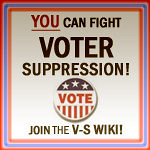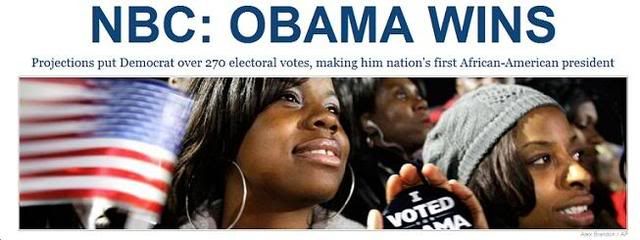They’re already voting in Dixville Notch, New Hampshire, so Election Day has officially begun. Showtime!
 We’ve just finished our last minute polishing for the Voter Suppresssion Wiki, with a redesigned home page, a Voter Suppression Documented summary with snippets of a dozen different examples, final touches to the Media Room, the Prepare for election day action alert, and a chat room. We’ve continued to get some great press, with Caitlin Johnson’s Txt the Vote: Election Protection Goes High Tech on OneWorld/Yahoo News! featuring one of our members, and Simon Jones’ Citizens, Media Use Social Media to Monitor Election giving some great context.
We’ve just finished our last minute polishing for the Voter Suppresssion Wiki, with a redesigned home page, a Voter Suppression Documented summary with snippets of a dozen different examples, final touches to the Media Room, the Prepare for election day action alert, and a chat room. We’ve continued to get some great press, with Caitlin Johnson’s Txt the Vote: Election Protection Goes High Tech on OneWorld/Yahoo News! featuring one of our members, and Simon Jones’ Citizens, Media Use Social Media to Monitor Election giving some great context.
We continue to have successes: flagging a deceptive report falsely claiming that people were arrested, getting our one-page What to do if you have problems document posted in a library in South Carolina.  Baratunde’s 90-second guide to election day video got over 1,000 views after YouTube selected it as a featured video. Another wiki member submitted her story to the Huffington Post. Multiply this by a few hundred people on our project — and dozens of other projects in the grassroots election protection and citizen journalism movement — and it adds up to a big impact.
On election day, the Incident Tracker will be where the action is on the wiki. We’ll be updating it regularly, sifting through the various sources on the web and threads in our discussion forum, and linking to any action alerts. Please check it out; and if you see any voter suppression or articles about it, please let us know about it!
Of course there are a many other sites around the web that also have great reporting. Here’s a quick roundup of a few other sites.
 Our Vote Live, a joint project of the Election Protection Coalition and EFF, features a live feed and queryable interface to the reports that go into the 1-866-OUR-VOTE hotline. With over 40,000 reports already, it’s a rich data source — for example, here’s their Ohio page, and the list of the 200 reported incidents so far of voter intimidation.
Our Vote Live, a joint project of the Election Protection Coalition and EFF, features a live feed and queryable interface to the reports that go into the 1-866-OUR-VOTE hotline. With over 40,000 reports already, it’s a rich data source — for example, here’s their Ohio page, and the list of the 200 reported incidents so far of voter intimidation.
Continue Reading »
 Judy Dubin of the Cramer Institute suggests looking at a meeting as a musical performance of classical music.  Via that lens, the asset-based thinking discussion list’s last conference call for 2009 was a work for guitar, four voices, and keyboards. It featured a prelude (Eve and I chatting while waiting for others to show up), three movements titled celebration, brainstorming, and anticipation, and a coda (this post and the ongoing discussions).
Judy Dubin of the Cramer Institute suggests looking at a meeting as a musical performance of classical music.  Via that lens, the asset-based thinking discussion list’s last conference call for 2009 was a work for guitar, four voices, and keyboards. It featured a prelude (Eve and I chatting while waiting for others to show up), three movements titled celebration, brainstorming, and anticipation, and a coda (this post and the ongoing discussions).


 We’ve just finished our last minute polishing for the
We’ve just finished our last minute polishing for the  Our Vote Live
Our Vote Live